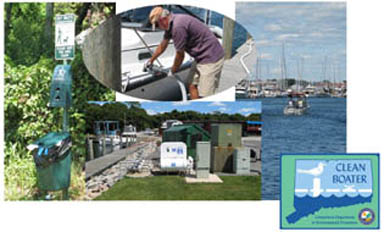Connecticut's Clean Boater Program

The cumulative impact of the approximately 165,000 recreational boats on Long Island Sound can be considerable, which is why it is important for each boater to share the responsibility for keeping our water clean.
Clean water and clean air make boating experiences more enjoyable. By becoming aware of some of the environmental hazards that are associated with boating, and using sound environmental boating practices, you can help protect our resources and ensure the future health of Connecticut’s waters.
As a companion to the Clean Marina Program, the Clean Boater Program encourages the state’s boaters to learn about and implement clean boating techniques.
What kind of boater are you?
It doesn’t matter if you are a sailboater, motorboater, or a paddler, we all get enjoyment from clean water, which is thriving with life. If you unintentionally leave trash, plastic, sewage, fishing line, or invasive species, you can have a negative impact on the quality of Connecticut’s waters.
What benefits do I receive from being a Clean Boater?
- Receive the Action Guide for Boaters: Clean Boating in Connecticut
- Receive a "Spill Kit", which contains environmental brochures, an oil/gasoline absorbant pad, and your Clean Boater decal
- Receive tips on how to be a cleaner boater
- A good feeling about protecting the environment
Why become a Clean Boater?
Long Island Sound (LIS) is a valuable natural resource. It provides us with food, jobs, recreation and beauty, as well as provides unique habitat for fish, birds and wildlife. LIS also supports precious wetlands, which improve water quality and provide food and habitat. Like other major water bodies along the East Coast, LIS can only take so much. Pollutants enter the Sound from various sources. You can help by using some common clean boating practices to help keep pollutants out of LIS.
How do I sign the Clean Boater pledge?
Our Boating Education Assistant can be found at many of state boat launches, or you can call the Boating Division at (860) 434-8638 to schedule an appointment to sign the pledge and receive a voluntary U.S. Coast Guard Auxiliary Vessel Safety Check.
Tips for Clean Boating on Long Island Sound
-
Perform maintenance work away from the water and use drop cloths and vacuum sanders to keep paint, debris, and cleaners out of the water.
-
Share leftover paint and varnish with other boaters; encourage them to do the same.
-
Recycle your oil, oil filters, antifreeze, engine batteries and zincs.
-
Minimize your use of harmful chemicals with safe substitutes whenever possible.
-
Prevent spills by fueling slowly and carefully. Don't "top off" or overfill your fuel tank. Use absorbent materials to catch drips.
-
Use pumpouts of dump stations to properly dispose of boat sewage.
-
Recycle non-hazardous wastes like aluminum, plastics, newspapers, cardboard, etc. and bring trash back to shore.
-
Protect sensitive habitats by proceeding slowly in shallow water to minimize erosion from wakes and avoiding contact with underwater vegetation.
-
Remove all vegetation from your boat and trailer.
Content Last Updated on December 16, 2019.

